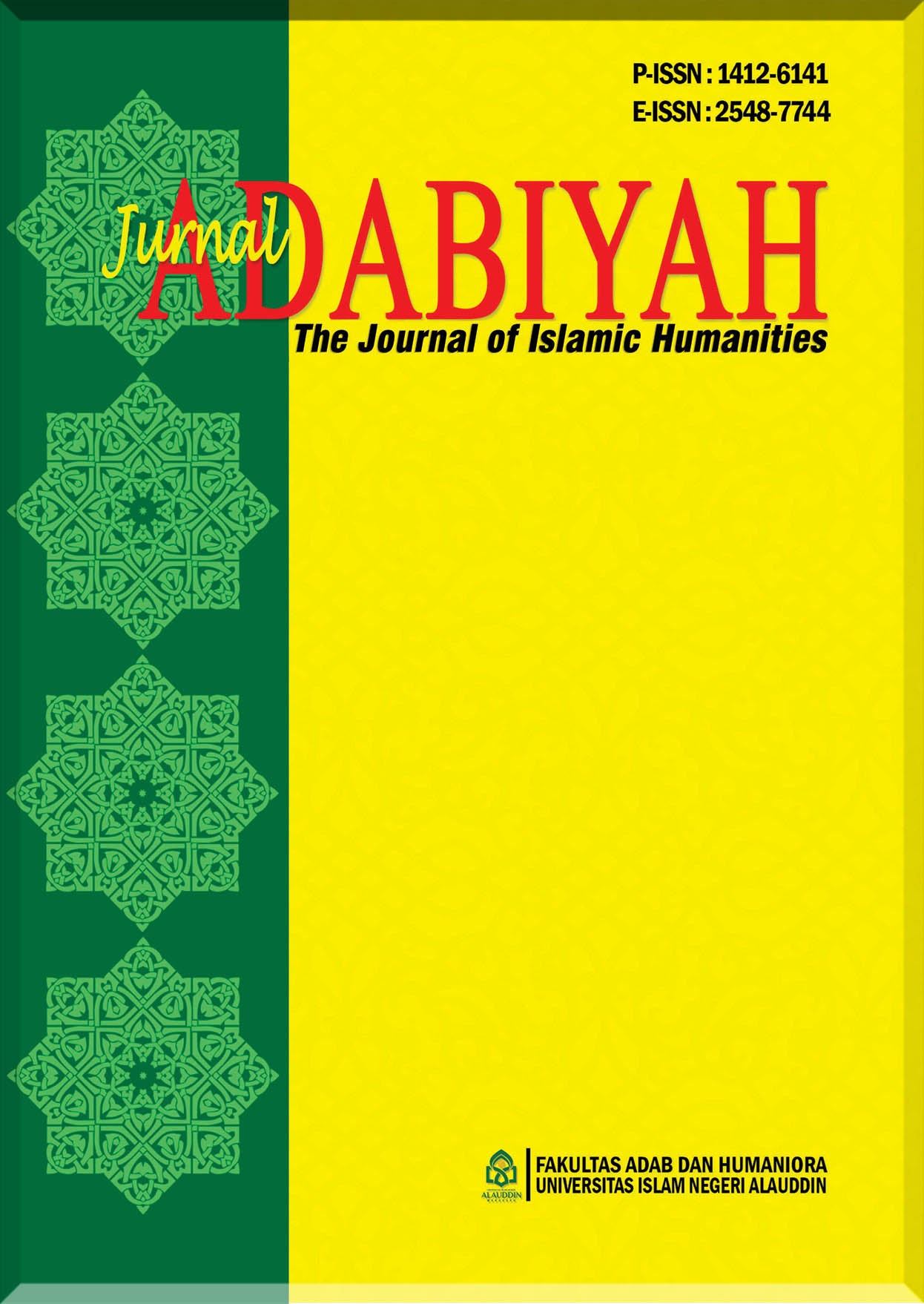Power Domination and Resistance in Nawal El Saadawi's Mawtu Ma'ali Al-Waziri Sabiqan: Antonio Gramsci's Hegemony
DOI:
https://doi.org/10.24252/jad.v25i2a8Keywords:
Gramsci, Hegemony, Resistance, Ideology, PhysicalAbstract
This research explores the dynamics of hegemony and resistance in Nawal El Saadawi’s novel Mawtu Ma‘ali al-Waziri Sabiqan through the lens of Antonio Gramsci’s theory of cultural hegemony. The research takes Gramsci’s concepts of ideological domination and counter-hegemonic struggle as its formal object, while the novel serves as the material object. Using a qualitative descriptive approach and a critical reading method grounded in ideological literary theory, this research positions itself within contemporary Arabic literary research that intersects with cultural-political analysis. The findings indicate that power in the novel operates not only through coercive mechanisms but also through ideological consent embedded within social institutions and dominant narratives that regulate behavior, identity, and voice. Resistance emerges as both symbolic and material acts of defiance that challenge the prevailing ideological structures. This research highlights literature as a site of negotiation between power and ideology, offering valuable insight for literary and cultural studies in understanding how texts mediate sociopolitical relations and contestations.
ملخص
تستكشف هذه الدراسة ديناميكيات الهيمنة والمقاومة في رواية نوال السعداوي "موت معالي الوزيري سابقان" من خلال منظور نظرية أنطونيو غرامشي في الهيمنة الثقافية. تتخذ هذه الدراسة مفهوم غرامشي للهيمنة الأيديولوجية والصراعات المضادة للهيمنة موضوعًا شكليًا لها، بينما تُمثل الرواية موضوعها المادي. باستخدام منهج وصفي نوعي وأساليب قراءة نقدية ترتكز على النظرية الأدبية الأيديولوجية، تضع هذه الدراسة نفسها ضمن البحث الأدبي العربي المعاصر المتقاطع مع التحليل الثقافي السياسي. تشير النتائج إلى أن القوة في الرواية لا تعمل فقط من خلال آليات الإكراه، بل أيضًا من خلال الموافقة الأيديولوجية المضمنة في المؤسسات الاجتماعية والسرديات السائدة التي تنظم السلوك والهوية والصوت. تبرز المقاومة كأفعال تحدٍّ، رمزية ومادية، تتحدى البنى الأيديولوجية السائدة. تُسلط هذه الدراسة الضوء على الأدب كساحة للتفاوض بين القوة والأيديولوجيا، مقدمةً رؤى قيّمة للدراسات الأدبية والثقافية في فهم كيفية توسط النصوص في العلاقات الاجتماعية والسياسية والصراعات
Abstrak
Penelitian ini mengeksplorasi dinamika hegemoni dan perlawanan dalam novel Mawtu Ma‘ali al-Waziri Sabiqan karya Nawal El Saadawi melalui lensa teori hegemoni budaya Antonio Gramsci. Penelitian ini mengambil konsep dominasi ideologis dan perjuangan kontra-hegemoni Gramsci sebagai objek formalnya, sementara novel berfungsi sebagai objek materialnya. Dengan menggunakan pendekatan deskriptif kualitatif dan metode pembacaan kritis yang berlandaskan teori sastra ideologis, penelitian ini memposisikan dirinya dalam penelitian sastra Arab kontemporer yang bersinggungan dengan analisis budaya-politik. Temuan menunjukkan bahwa kekuasaan dalam novel beroperasi tidak hanya melalui mekanisme koersif, tetapi juga melalui persetujuan ideologis yang tertanam dalam institusi sosial dan narasi dominan yang mengatur perilaku, identitas, dan suara. Perlawanan muncul sebagai tindakan pembangkangan, baik simbolis maupun material, yang menantang struktur ideologis yang berlaku. Penelitian ini menyoroti sastra sebagai arena negosiasi antara kekuasaan dan ideologi, menawarkan wawasan berharga bagi studi sastra dan budaya dalam memahami bagaimana teks memediasi hubungan dan kontestasi sosiopolitik.
Downloads
References
Adamson, Walter. “Gramsci and the Politics of Civil Society.” Praxis International 7, no. 3+ 4 (1987): 320–39.
Adya Wijaya, Naufal, Rohanda Rohanda, and Ihin Solihin. “Hegemony of Power in the Film ‘Cairo Conspiracy’ by Tarik Saleh (Antonio Gramsci’s Theory of Hegemony).” Journal on Interdisciplinary Studies in Humanities 8 (2025): 2025. Https://doi.org/10.34050/elsjish.v8i2.44621.
Ahmadi, Anas. “Representasi Hegemoni Gramsci Dalam Novel’Teruslah Bodoh Jangan Pintar’Karya Tere Liye.” EUNOIA (Jurnal Pendidikan Bahasa Indonesia) 5, no. 1 (2025).
Downloads
Published
How to Cite
Issue
Section
License
Copyright (c) 2025 Ridho Hidayat, Rohanda, Dendi Yuda S

This work is licensed under a Creative Commons Attribution-NonCommercial-ShareAlike 4.0 International License.
COPYRIGHT AND LICENSE STATEMENT
COPYRIGHT
Jurnal Adabiyah is published under the terms of the Creative Commons Attribution license. Authors hold the copyright and retain publishing rights without restriction to their work. Users may read, download, copy, distribute, and print the work in any medium, provided the original work is properly cited.
LICENSE TO PUBLISH
1. License
The use of the article will be governed by the Creative Commons Attribution license as currently displayed on http://creativecommons.org/licenses/by/4.0.
2. Author’s Warranties
The author warrants that the article is original, written by stated author/s, has not been published before, contains no unlawful statements, does not infringe the rights of others, is subject to copyright that is vested exclusively in the author and free of any third party rights, and that any necessary written permissions to quote from other sources have been obtained by the author(s).
3. User Rights
Under the Creative Commons Attribution license, the users are free to download, reuse, reprint, modify, distribute and/or copy the content for any purpose, even commercially, as long as the original authors and source are cited. No permission is required from the authors or the publishers.
4. Co-Authorship
If the article was prepared jointly with other authors, the corresponding author warrants that he/she has been authorized by all co-authors, and agrees to inform his/her co-authors of the terms of this statement.
5. Miscellaneous
Jurnal Adabiyah may conform the article to a style of punctuation, spelling, capitalization, and usage that it deems appropriate. The author acknowledges that the article may be published so that it will be publicly accessible and such access will be free of charge for the readers.




